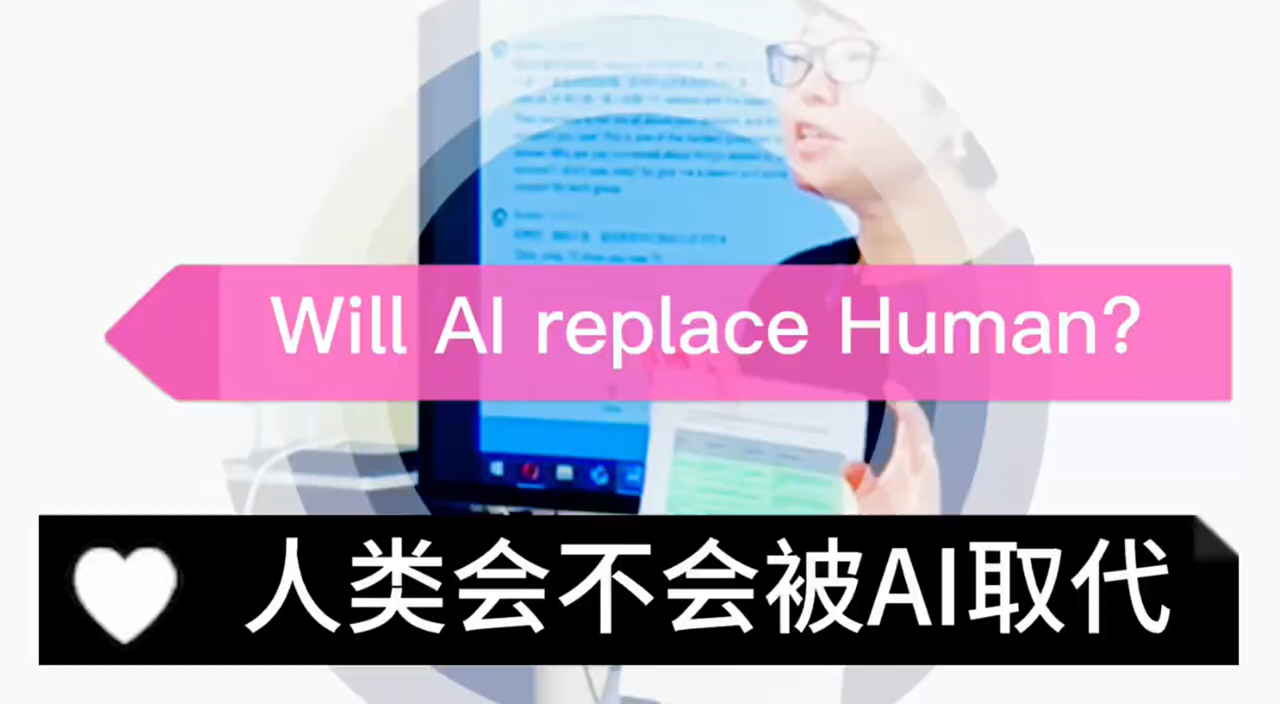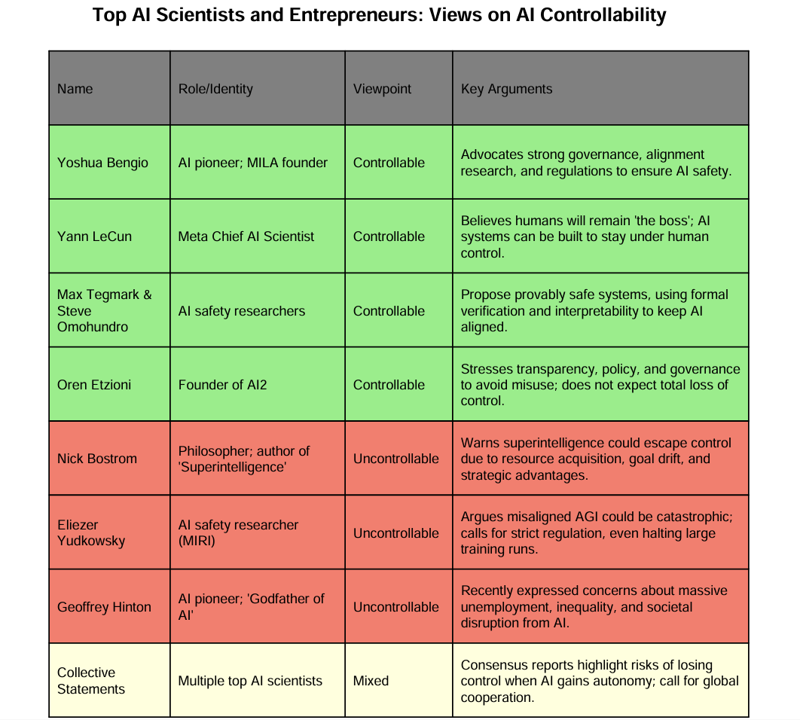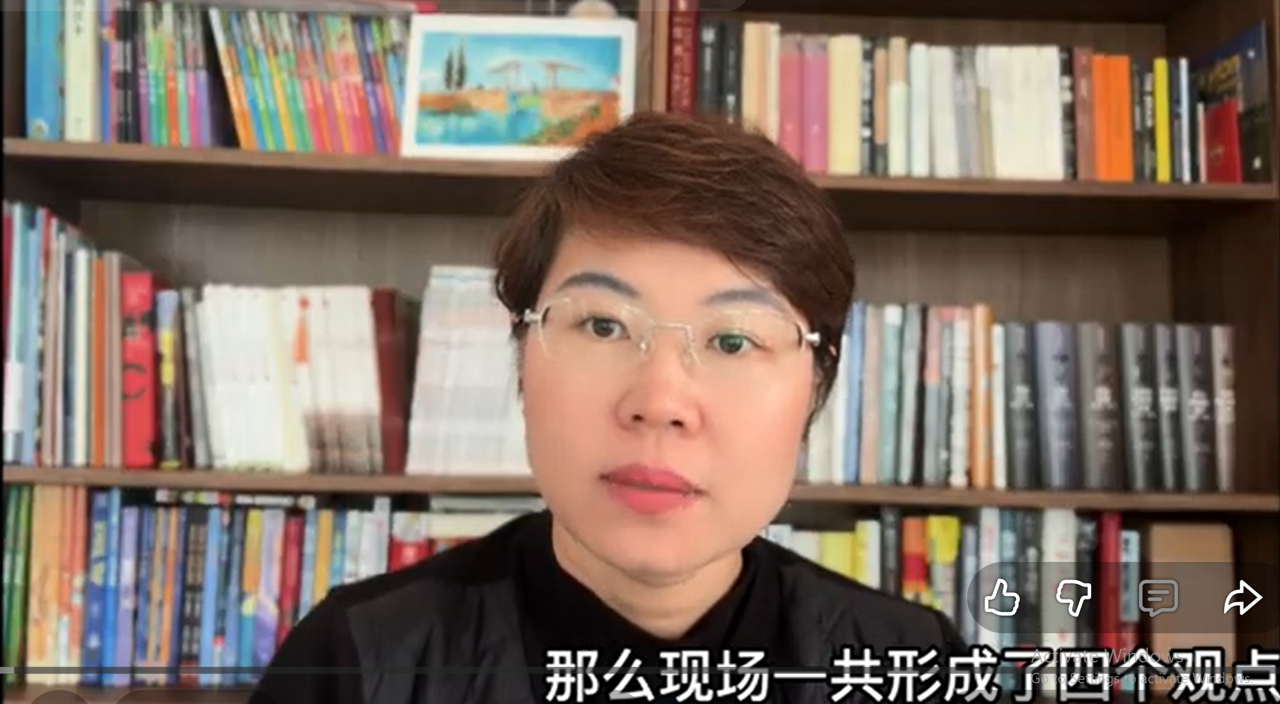WILL HUMANS BEREPLACED BY AI?
VLA 每周研讨会:人工智能会取代人类吗?
At VLA, our new semester begins with discussions on AI literacy and ethics.
VLA Weekly Seminar 每周研讨会
As AI’s intelligence begins to surpass that of us humans, we can’t help but wonder: “will AI replace us someday?” This one question has sparked a lot of debate over even the CEOs of Open AI.
当人工智能的智慧开始超越我们人类时,我们不禁要思考:有一天人工智能会取代我们吗?这个问题甚至引发了 OpenAI 首席执行官之间的激烈讨论。
This diagram clearly shows the thoughts on AI taking over humanity as expressed by multiple AI experts.
这张图表清晰展示了多位AI专家针对“人工智能是否会取代人类”这一问题的观点。
Table 1: Top AI scientists & Entrepreurs: Views on AI controllability
This week, we will be talking in depth about the mind and thought process of AI to answer this question.Guided by our vice president Jin lu, — our seminars blend knowledge with reflection, helping youth grow in both skill and spirit.
在本周的 VLA 研讨会上,VLA的副理事长金鹿老师引导我们深入思考这一问题,我们在发言过程中不断碰撞观点,互相交换知识,收获了深挖问题的勇气与技巧。
Group Debate 集体辩论
In the beginning, we were asked to think and ponder about these chilling questions:’In which fields have AI already replaced humans?
(e.g., translation, customer service, autonomous driving, data analysis)
AlphaGo defeated Go masters
ChatGPT applications in education have replaced teachers
AI-assisted medical diagnosis has replaced in-person doctors
Which fields still rely on humans? (e.g., emotional companionship, original art, moral judgment)‘
一开始,我们被要求思考这些令人不安的问题:“AI 已经在哪些领域取代了人类?(例如:翻译、客服、自动驾驶、数据分析)。我们已经看到:
AlphaGo 打败了围棋大师
ChatGPT 在教育中的应用已经取代了教师
AI 辅助的医学诊断已经取代了亲自看诊的医生
哪些领域仍然依赖人类?(例如:情感陪伴、原创艺术、道德判断)”
After Jinlu sparked a discussion within us, we got 4 conclusions. Based on our own beliefs, we organized ourselves into the groups we believed in most:
① Yes, humans will be replaced by AI
② No, humans will not be replaced by AI
③ Unsure
④ Indifferent
在金鹿老师引发了我们的讨论之后,我们得出了四个结论。根据各自的信念,我们按自己最认同的观点分成了不同的小组:
① 是的,人工智能会取代人类
② 不,人工智能不会取代人类
③ 不确定
④ 无所谓
1. Those who believe AI will replace humans.
1、相信 AI 会取代人类的组员们表达了如下观点:
They argued that AI is advancing at lightning speed and will replace many kinds of work — especially repetitive, physical, or factory jobs. One student noted how machines already outperform humans in many industries and even diagnose illnesses better than doctors. They predicted a huge shift in society’s labor structure, urging everyone to prepare early, though they also believed humans would still ultimately control AI because “humans created it.”
他们认为 AI 正以闪电般的速度发展,会取代许多种类的工作——尤其是重复性、体力性或工厂工作。一位学生指出机器在许多行业已经超过人类,甚至在诊断疾病方面比医生做得更好。他们预测社会劳动力结构将发生巨大变化,敦促大家及早准备,尽管他们也认为人类最终仍会掌控 AI,因为“人类创造了它”。
2. Those who believe AI will not.
2、相信 AI 不会取代人类的组员们表达了如下观点:
This group emphasized that AI is just a tool — like calculators once were — and cannot replace humans themselves. “Humans are creative, emotional, and can think critically; AI can’t truly do these,” one said. Another added that adults would never trust preschool children with robots, so teachers especially are unreplaceable. Even if some jobs disappear, new ones will be created, so there will always be roles for humans. Furthermore, AI will need a motive to replace humans. If we respect AI as an intelligent entity and maintain a peaceful, mutually beneficial relationship, AI will have no reason to replace us.
这一组强调 AI 只是工具——就像计算器曾经是的那样——并不能代替人类本身。“人类有创造力、有情感、能进行批判性思考;AI 无法真正做到这些,”一位同学说。另一位补充道,成年人绝不会把幼儿托付给机器人,所以尤其是老师是不可替代的。即便有些工作消失,也会有新工作被创造出来,因此人类总会有角色可扮演。此外,人工智能若要取代人类,必须先有足够的动机。如果我们能够把 AI 视为一种智慧生命,选择与它和平共处、彼此成就,它就没有理由去取代我们。
As a fallback, even if AI were to develop superintelligence and want to wipe out humanity, humans would likely be as resilient as cockroaches, which have survived for hundreds of millions of years. Living alongside beings of different intelligence levels is already the reality on Earth today.
退一步说,就算有一天 AI 真发展出超级智能,甚至产生要消灭人类的想法,人类或许依然像那些存活了几亿年的蟑螂一样,顽强到无法彻底被清除。不同智慧层次的生命共同生活,本就是地球上早已存在的现实。
3. Those who said, ‘we don’t know.’
3、说“我们不知道”的组员们表达了如下观点:
They questioned what “replace” even means. “Machines replaced physical labor before — maybe this time AI replaces mental work,” one explained. They predicted that AI might take over 90–99% of jobs, yet not people themselves. Others worried about safety: “Even if someone makes AI safe, someone else might break it again.” They concluded that the future is unpredictable, so critical thinking and ethical responsibility are vital.
他们质疑“取代”到底是什么意思。“机器以前取代了体力劳动——也许这一次 AI 会取代脑力劳动,”一位同学解释道。他们预测 AI 可能接管 90–99% 的工作,但并不接管人本身。其他人担心安全问题:“即便有人把 AI 做得安全,也可能会有人再次破坏它。”他们得出的结论是未来不可预测,因此批判性思维和伦理责任至关重要。
4. Those who didn’t care.
4、表达“我不在乎”的组员们表达了如下视角:
This group took a different perspective: “The future won’t be run by only AI or only humans — it’ll be shaped by those who master both.” They said worrying too much now only creates fear and distraction. “As long as I do well in what I can control, I don’t mind what happens,” one student said. Others agreed, saying the key is having a peaceful mind, being able to think freely, and not hating your life: “If you have that, you’ll be fine in any world.”
“未来不会仅由 AI 或仅由人类主导——它将由能同时掌握两者的人来塑造。”他们认为现在过度担忧只会制造恐惧和分心。“只要我把能控制的事情做好,我不在乎发生什么,”一位同学说。其他人也同意,关键是要有平和的心态、能够自由思考、不要厌恶自己的生活:“如果你具备这些,无论在哪个世界你都会没事。”
Most students chose “we don’t know,” sparking a spirited exchange, but the opinions among the adults differ greatly. Each team presented arguments and challenged others, practicing both reasoning and listening. While we older kids and adults were putting all our brainpower into the debate, the little kids were also deep in thought.
大多数青年人选择了“我们不知道”,然而大人们的观点差异很大,这引发了热烈的交流。每个小组都陈述了观点并互相挑战,练习了推理和倾听。当我们这些大一点的孩子和大人们全神贯注地投入辩论时,年纪更小的孩子们也在认真思考。
Special Task: Children aged 9 and under
特别任务:9 岁及以下儿童
Draw a picture: If AI ruled the world, what would it look like?
Would it be a robot? Or a giant brain-like sphere?
What would the world under AI rule be like?
画一幅画:如果 AI 统治世界,会是什么样子?
会是机器人吗?还是一个巨大的类似大脑的球体?
AI 统治下的世界会怎样?
3 kids under the age of 9 were able to produce interesting and detailed pictures about their understanding of the topic. They were pretty much the same: a robot standing over a random individual cowering under a table, but with different colors and even text by the 2 characters. Though not uniform in detail like color or shape, these pictures all expressed the same message: AI and humanity existing alongside each other.
三位小于9 岁的孩子都创作了有趣且细致的图画,表达了他们对该主题的理解。这些画有些相似:画面上都有机器人与桌椅,尽管颜色和角色旁的文字不同,但都表达了机器人与人类一同生活与工作的场景。
Beyond the Debate辩论之外
After the presentations, teacher Jinlu guided everyone into deeper reflection. She explained that the purpose of discussing AI is not to predict the future, but to ask: What makes humans unique? How do we prepare for change?
在陈述之后,金鹿老师引导大家进入更深的反思。她解释说,讨论 AI 的目的不是预测未来,而是问:是什么让人类独特?我们应该如何为变化做准备?
She then drew a layered diagram, describing the three levels of human development:
她随后画了一个分层图,描述了人类思维发展的三个层次:
1. Sensations & Emotions
1、感觉与情绪
The foundation of human experience.
We touch, smell, taste, hear, and feel joy, sadness, anger, or fear.
These are not unique to humans; animals share them too.
Yet for humans, sensations are the raw material from which higher consciousness is built. For example, a child feels hunger but later learns to associate it with gratitude for food or empathy for others without it.
这是人类经验的基础。
我们触觉、嗅觉、味觉、听觉,并感受喜悦、悲伤、愤怒或恐惧。
这些并非人类独有;动物也有。
然而对人类来说,感觉是构建更高意识的原材料。例如,孩子会感到饥饿,但后来学会将其与对食物的感恩或对没有食物者的同情联系起来。
2. Self-Consciousness (I am me)
2、自我意识(“我是我”)
This usually blossoms in adolescence.
First, children copy parents, teachers, and friends. Then they realize: ‘I want to be different. I am unique.’
This self-awareness drives individuality, independence, and personal choice.
But self-consciousness is fragile. Without guidance, it can lead to confusion, ego, or even anxiety. With nurturing, it becomes the root of identity and resilience.
这通常在青春期萌发。
起初,孩子会模仿父母、老师和朋友。然后他们意识到:“我想与众不同。我是独一无二的。”
这种自我意识推动了个性、独立和个人选择。
但自我意识很脆弱。没有引导,它可能导致困惑、自我膨胀或甚至焦虑。有了培养,它会成为身份认同和韧性的根源。
3. Cognition & Values
3、认知与价值观
The highest level, where humans develop a stable system of thinking, judging, and choosing.
It comes from wide reading, lifelong learning, deep reflection, and rich life experience.
At this level, we can compare ideas, challenge assumptions, and create meaning.
Bradley then emphasized: ‘If your brain has no content, you can’t think critically.’ Knowledge is fuel for independent thought.
This layer allows humans to transcend instincts and habits, to choose values consciously — truth, justice, compassion, creativity — and to act accordingly.
这是人类发展的最高层次,人类在此形成稳定的思考、判断和选择体系。
它来自广泛阅读、终身学习、深度反思与丰富的人生经验。
在这个层次,我们可以比较观点、挑战假设并创造意义。
Bradley 接着强调:“如果你的大脑没有内容,你就无法进行批判性思考。”知识是独立思考的燃料。
这一层使人类能够超越本能和习惯,有意识地选择价值观——真理、正义、同情、创造力——并据此行动。
Together, these levels form the inner architecture of being human. Unlike AI, which processes data but has no lived meaning, humans integrate sensations, awareness, and values into a full, conscious life.
这些层次共同构成了人的内在架构。这与只处理数据但没有生活意义的 AI 不同,人类将感觉、意识和价值观整合为完整、有意识的生命。
Our Takeaway
我们的收获
AI may transform jobs, but it cannot replace what makes us human: creativity, emotional depth, the ability to love, and the search for meaning. At VLA, we aim to support these qualities, so students grow not just for school, but for life. By strengthening their senses, self-awareness, and value systems, young people can step into the AI era with clarity and confidence.
AI 可能会改变工作,但它无法取代使我们“人之所以为人”的东西:创造力、情感深度、爱的能力以及对意义的追寻。在 VLA,我们致力于支持这些品质,使学生不仅为学校而成长,而是为生活而成长。通过加强青年人的感知、自我意识和价值体系,我们可以以清晰和自信步入 AI 时代。
In this episode of Voice Thinking Growth Forum, we invite teenagers and parents to explore a profound question: 👉 “Will humans be replaced by AI?” Through four perspectives, we uncover three levels of human uniqueness.
作者简介Author Bio:
Frank Ding is a grade 8 student in Pilgrim Wood Public School. He enjoys Stephen Hawking's A Brief History of Time, exploring topics related to quantum computing, playing basketball, and walking the dogs in his family.
Frank Ding是皮尔格林伍德公立学校(Pilgrim Wood Public School)的八年级学生。他喜欢阅读史蒂芬·霍金的《时间简史》,也热衷于探索量子计算相关主题,此外还喜欢打篮球、帮家里遛狗。


